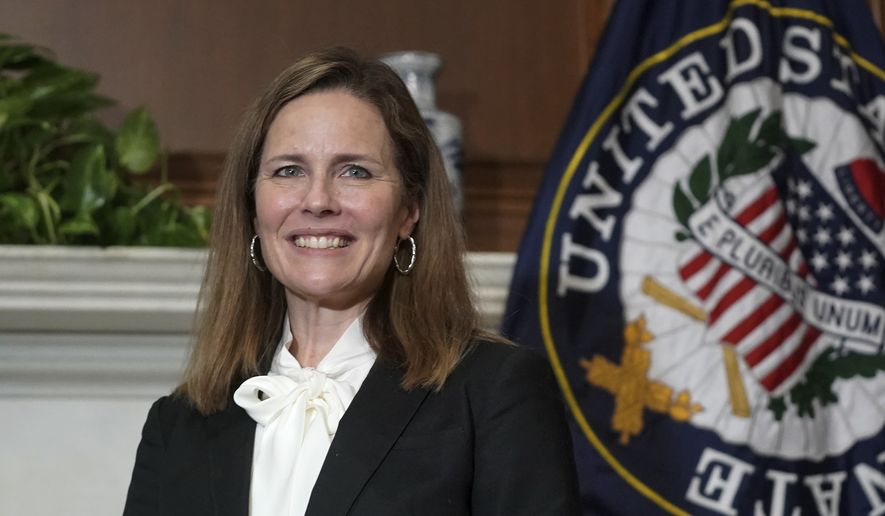Supreme Court nominee Judge Amy Coney Barrett came under fire Wednesday from Senate Democrats who labeled her a threat to abortion, immigration and workers’ rights.
Sound familiar?
They made similar complaints about both of President Trump’s prior Supreme Court picks, Justices Neil M. Gorsuch and Brett M. Kavanaugh, whom they accused of being anti-worker and anti-women.
The Senate’s Republican majority has lined up enough votes to confirm Judge Barrett, which is expected to happen by the end of the month. But Democrats are working feverishly to delay the process and discredit the nominee.
Stepping back from anti-women rhetoric, Democrats zeroed in on Judge Barrett’s Catholic faith as a flaw and pushed that message in the press.
The Washington Post published an article this week critical of Judge Barrett for not disclosing her membership in the religious group People of Praise. Critics described the group as advocating for traditional gender roles for men and women in households.
Sen. Dianne Feinstein of California, the top Democrat on the Judiciary Committee, wrote the Justice Department a letter accusing Judge Barrett of not disclosing a 2006 anti-abortion article that the senator claimed had an unspecified connection to the nominee.
Sen. Tammy Duckworth, Illinois Democrat, pointed to a 2006 newspaper ad by the St. Joseph County Right to Life organization, which Judge Barrett allegedly supported, saying it asked people “to pray to end abortion.”
Judge Barrett will have the opportunity to defend her judicial record — and her religious beliefs — during four days of confirmation hearings scheduled to begin Monday.
She spoke to several Democratic members of the Judiciary Committee on Wednesday by phone ahead of next week’s grilling.
“During these calls, the judge emphasized the importance of judicial independence and spoke about her judicial philosophy and family,” said White House spokesman Judd Deere.
Sen. Chris Coons, Delaware Democrat and a committee member who spoke with the nominee, said she would tilt the high court further to the right.
“I’m increasingly convinced that she’s even more conservative than Justice [Antonin] Scalia for whom she clerked on the Supreme Court and she has demonstrated a willingness to reverse long-settled precedent,” he said.
Sen. Todd Young, Indiana Republican, said Democrats were trying everything they can think of to distract from the superb legal qualifications of Judge Barrett, who also hails from Indiana.
“Judge Barrett has a strong record of applying the law as written and not legislating from the bench. As she herself has said, ’A judge is obligated to apply the law as it is and not as she wishes it would be. She is obliged to follow the law even when her personal preferences cut the other way or when she will experience great public criticism for doing so,’” Mr. Young told The Washington Times.
Polls show the public is warming to the president’s nominee, bolstering the GOP’s push to confirm her ahead of the Nov. 3 elections.
A Morning Consult/Politico poll conducted Oct. 2 through Oct. 4 found that 46% of respondents said the Senate should confirm Judge Barrett as soon as possible. That’s up 9% since Mr. Trump officially nominated her for the high court’s vacancy last month following Justice Ruth Bader Ginsburg’s death.
Republicans have pushed back against the attacks on Judge Barrett’s religion, saying the Constitution prohibits discrimination on the basis of faith.
“The Constitution is clear: SCOTUS nominees should never be required to pass a religious test. So why do the media & my friends on the Left continue to attack Judge Barrett’s religious faith?” tweeted Sen. Joni Ernst, a member of the Judiciary Committee.
“Judge Barrett should be evaluated on her qualifications & character, not her faith,” the Iowa Republican added. “I am committed to evaluating Judge Barrett on the basis of her qualifications & character, not her religious faith.”
Senate Democrats also have raised issues with how the judge would rule on cases involving abortion restrictions, workers’ rights and immigration.
They pointed out that in her three years on the 7th U.S. Circuit Court of Appeals, she twice upheld restrictions on abortion.
“She would uphold the restrictions that states have imposed — in fact, more than 450 such restrictions over the past decade — on access to abortion and reproductive rights services. There are about 17 cases that are one step away from consideration in the Supreme Court, ranging from the 15-week abortion ban from Mississippi to waiting periods in Indiana,” said Sen. Richard Blumenthal, Connecticut Democrat and a member of the Judiciary Committee.
Mrs. Feinstein said Judge Barrett’s record as an appeals court judge threatens immigration policy, noting she voted to uphold the Trump administration’s public charge rule that set tougher standards to receive a green card.
“These policies strike at the heart of our country’s immigrant heritage and would reject the welcome we’ve extended to the ’huddled masses yearning to be free’ for centuries,” Mrs. Feinstein said.
Democratic Sens. Elizabeth Warren of Massachusetts and Sherrod Brown of Ohio took issue with Judge Barrett’s participation in a 7th Circuit ruling in which the full court ruled against a 58-year-old man who sued a company for age discrimination when he was denied a job opportunity because he had more years of experience than required. The employer, instead, hired a 29 year old.
Mr. Brown said Judge Barrett would be a “special interest judge” that “will always side with corporations over workers.”
“These cases don’t make big headlines, but they affect millions of workers’ lives,” he said.
• Alex Swoyer can be reached at aswoyer@washingtontimes.com.




Please read our comment policy before commenting.